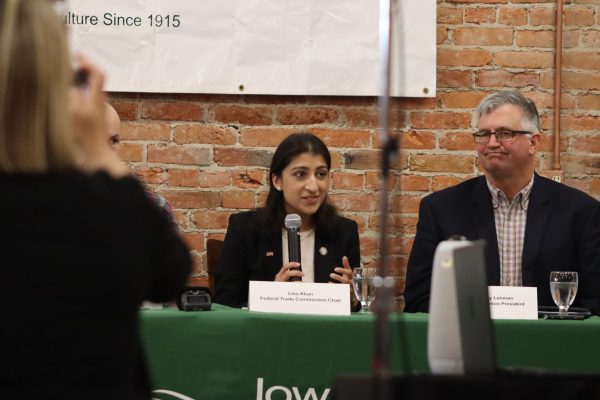Speaker blames war on ‘economic hit men’
October 19, 2007
John Perkins delivered a grimly revealing lecture about his past experiences with financially pressuring international political leaders in the Sun Room of the Memorial Union on Thursday.
In what could be called a surprise, however, Perkins’ words were laced with optimism.
Perkins, author of recently published “The Secret History of the American Empire: Economic Hit Men, Jackals, and the Truth about Global Corruption,” once worked as an “economic hit man.”
His job consisted of convincing political leaders of under-developed countries to accept very large loans from the U.S. government, loans which would ultimately be too vast for them to repay, Perkins explained to the audience.
Once the loans were in place – Perkins said “economic hit men” rarely failed in establishing them – the money was channeled to American corporations, which would then build infrastructures in those countries for such purposes as energy production.
Eventually, the “hit men” would demand repayment of the loans, knowing their next move would be to coax other favors from the poorer countries, since they had no ability to return the money.
These favors would manifest themselves in cheap oil or troop deployment for American conflicts, among many other possible things.
If the “hit men” failed, Perkins said, “jackals” would then take over, whose role it was to assassinate the uncooperative.
If “jackals” failed, the military would step in, he said. Perkins contended that the Iraq war is a result of just such a sequence of events.
Perkins said America has been using practices such as these since World War II, but with higher frequency in recent years.
While the author did give a few detailed narratives of his past experiences, he seemed to want to make his lecture more of an exhortation to challenge this system than a medley of its stories.
Corporations, or America’s “corporatocracy,” as Perkins put it, are the “emperor” of the American Empire; it is they, he said, who have had such enormous manipulative power on the global stage.
And it is the everyday citizens of America who have enormous power over those corporations, he said.
“We have had tremendous success at changing corporations when we’ve put our minds to it,” Perkins said, citing environmental and civil rights victories of the past.
He encouraged people to use whatever passions and talents they possessed to make decisions every day toward creating a “stable, sustainable and peaceful world.”
Examples of such decisions, he said, included buying clothing and other items that are not manufactured in sweat shops, as well as consuming less energy.
Nonprofit organizations, he said, can be very useful in bringing the larger corporations to important breaking points, where they will stop destructive processes and to listen to the people.
Perkins encouraged people to support such organizations as the Rainforest Action Network and the Heifer Project International, among others.
















